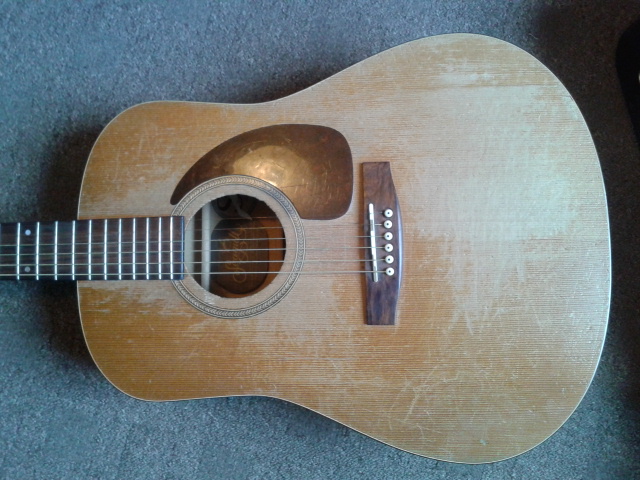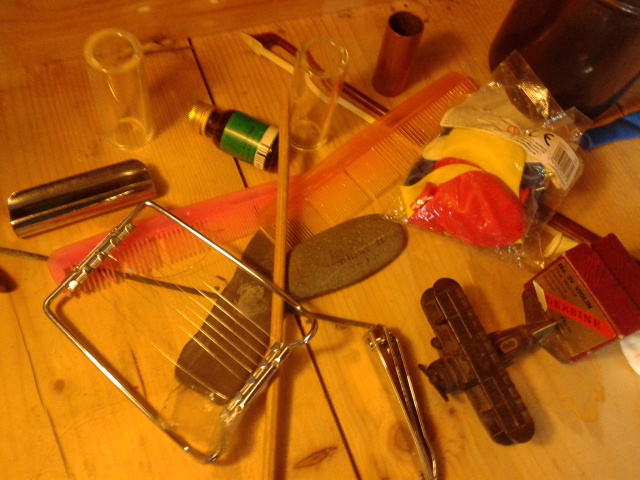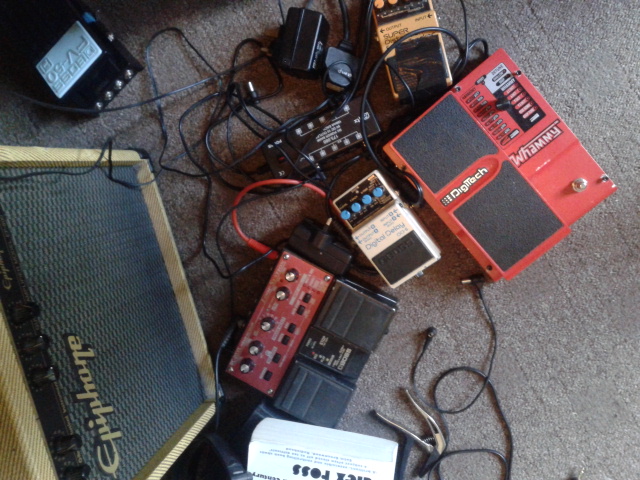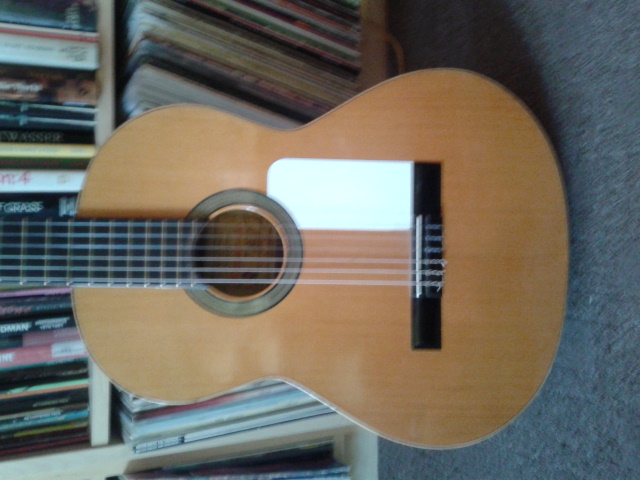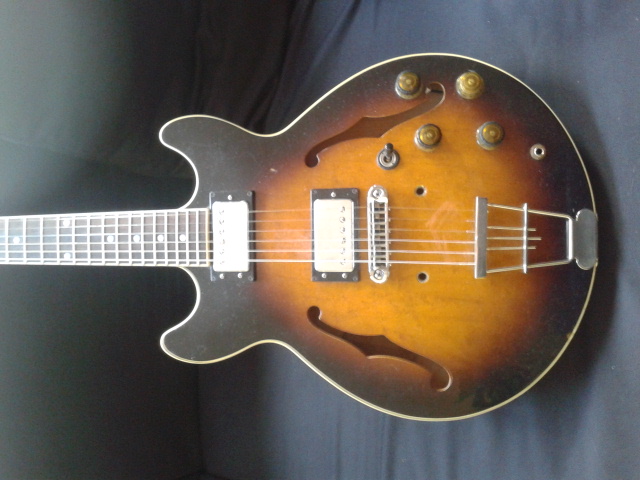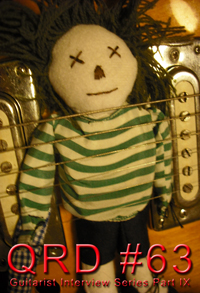
May 2013
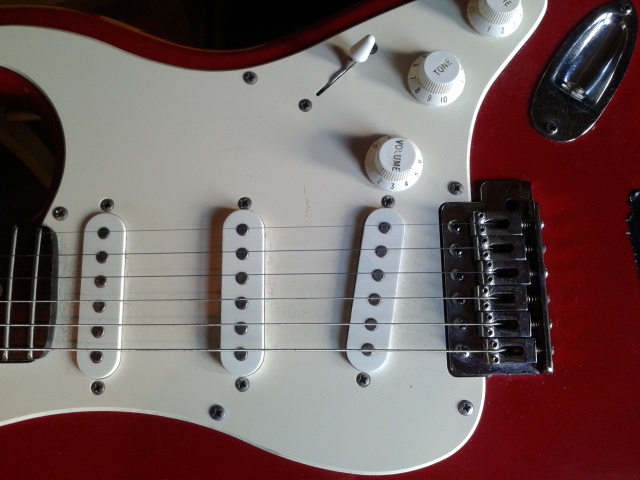
Bands: Kalbakken, Levenshulme Bicycle Orchestra, Stuckometer, Chastity Potatoe, Desmadrados los soldads de Ventura, Birchall/Cheetham Duo, Birchall/Brice/Marks Trio, various solo outings under own name, Ramallah Mumtaz Power Duo, Open Eye Duo…
Websites: www.davidmbirchall.com
QRD – What was your first guitar & what happened to it?
David – It was a red Encore, a mega cheap Strat copy. I saved up my paper round money. I still have some parts of the electrics kicking around.
QRD – What’s your typical set-up from guitar to effects to amplifier?
David – Right now guitar, volume pedal, overdrive pedal, amp.
QRD – What’s the most important part of your rig - guitar, amplifier, or effects?
David – Electric guitar & amplifier are the instrument; one doesn’t work without the other. Pedals are a sweetener.
QRD – What’s your main amplifier & why?
David – A little 50 watt Laney tube combo. Sounds good & can be got on the train/bus with relative ease.
QRD – What’s your main guitar & what are the features that make it such?
David – An Ibanez artist semi-hollow body. It’s easy to play & sounds amazing. You can get a really nice clipped trebly sound as well as mid warmth from it. Incredible feedback possibilities with the hollow body too & humbuckers too.
QRD – If you had a signature pedal, what would it be & what would some of its features be?
David – Something with infinite sustain & possibility to gliss up notes. I think this might be an ebow actually rather than a pedal!
QRD – How many guitars do you own?
David – Four that are playable. Two electric; the already mentioned Ibanez & a cheapo Strat copy by Sunn Mustang, I really like having an instrument around that it doesn’t really matter if anything terrible happens to it; potentially very liberating. Two acoustics, a Seagull massive finger picking thing, which sounds totally beautiful but I’ve come to realize is physically too big for my frame so I’ll need a much smaller bodied acoustic next time; this will be replaced at some point; a lot of the work with this acoustic has involved preparations & textural work on the body so a lot of the varnish has perished. That in turn has made the frontplate vibrate in an even more incredible way, but its only a matter of time before its completed fucked; its kind of like when you have a dying battery in something & it sounds wild. Final playable instrument is a Spanish guitar by Alhambra; it’s a nice instrument, entry level thing from the 1970s. Lots of carcasses & bits too. Some weird self-built things that probably don’t count as guitars more like strings attached to pieces of wood.
QRD – How & where do you store your guitars?
David – In cases, around the house, in corners of practice rooms.
QRD – How much do you think a good guitar should cost?
David – Depends what you will use it for & what sound you want to make. Obviously the more you pay, the better made an instrument will be. A lot of it is in your hands irrespective of what the instrument you are playing is.
QRD – Do you upgrade & customize your guitars or just stick with what you get?
David – The Ibanez I have fiddled with a bit: a metal nut for increased feedback potential & durability. An extend tailpiece for note bends, behind bridge strikes, & so on.
QRD – How thoroughly do you research or test a piece of equipment before buying it?
David – Read up, YouTube, try one at guitar shop,
QRD – Do you change your rig around often?
David – Yes depends on the group/situation like to throw in delays, looper, mixer, more speakers, tapes, etc. if the situation demands it.
QRD – Are you after one particular guitar tone & locking into it, or do you like to change your tone around a lot?
David – It changes, recently added overdrive pedal again of years of using amp breakup.
QRD – How old were you when you started playing guitar?
David – 14.
QRD – At what age do you think you leveled up to your best guitar playing?
David – My mid-twenties. Concentrated practice.
QRD – Why do you think a guitar fits you more so than other instruments?
David – Partly habit now. I’ve played it for a long time & feel very comfortable using it as an instrument. I’ve extended my vocabulary on it to an extent where it feels possible to realize pretty much what I want with it. If I could go back in time & choose to start playing something from a young age, I’d probably find it exciting to learn an instrument with a similar range but without the limitation of frets/equal temperament: cello, trombone for example. For the things I want to do with music, I generally find it a pretty well fitting tool.
QRD – Do you think guitar should be people’s first instrument as often as it is?
David – I think it’s fine. They are the kind of instrument that lies around people’s houses & are accessible. You can learn informally on them; at least I did & I got a lot more out of that than crappy recorder & keyboard lessons at school.
QRD – Do you see your guitar as your ally or adversary in making music?
David – An ally for sure. One to know the furthest limits of without doing any damage to it, but definitely a familiar & useful tool
QRD – Who are the guitarists that most influenced your playing & sound?
David – Dave Pajo, Derek Bailey, Sonny Sharrock, John Fahey, John Renbourne, Bert Jansch, Segovia, Tommy Iommi, Booker White, Blind Lemon Jefferson, Son House, Ian Williams, Bill Frisell, Ali Farke Toure, Jeff Parker, Andy Moor, Terrie Ex, Thurston Moore, Lee Ranaldo, Dan Bridgwood-Hill, Fred Frith, Keith Rowe, Neil Davidson, Leke Benson. Some of these are huge influences & some very indirect & subtle.
QRD – Do you think people anthropomorphizing their guitars is natural or silly (e.g. naming their guitar)?
David – It’s part of me when I’m playing, not something else.
QRD – What’s the most physical damage you’ve done to a guitar & how did you do it?
David – Mainly breaking strings. Never been able to afford anything more dramatic. My crappy Strat copy fell off the stage last night after the gig with Desmadrados, but was unbroken.
QRD – What do you do to practice other than simply playing?
David – Work with rhythm, active listening, drawing sound, reading/writing, written reflection on stuff I’ve done gigging & practice.
QRD – How many hours a week do you play guitar & how many hours would you like to?
David – A couple of hours a day. Probably double that.
QRD – What type of pick do you use & why?
David – Usually fingers, but when I do it’s a grey Dunlop one, 0.60? Also was given a metal pick, which I really like right now.
QRD – What gauge strings do you use & why?
David – Pretty light right now, 0.9 as high E. Before I was using much heavier as they sounded better, but compromised for being able to move around the neck easier.
QRD – How often do you change strings?
David – Before tour/when they look tired & dirty. Some of the work with preparations/objects I do really grinds them down, so sometimes they need changing every week/even daily if I’m working a lot with some stone/metal type preparations.
QRD – How often do you break strings?
David – Less & less, but I still have an incredibly heavily right hand attack, which I’m working on varying. Also some of the behind the bridge work I really enjoy involves a certain amount of excess pressure on the string at the bridge so they can ping often there: but I’m getting better at knowing where the limit for this is.
QRD – Which do you feel is more proficient, your strumming hand or fretting hand & how does that effect your style?
David – Good question. I think in terms of traditional playing, probably my left does more work, in terms of adding to the melody with pull ons/offs, hammering on, & so on. I mean I practice just playing with the left hand as a separate thing; I do lots of work on creating dense areas of notes through finger tapping with my left hand too. I still try to practice working with new chord shapes, patterns, runs; playing music you are not familiar with is really handy in this respect - I’ve used Bach pieces & Boss Nova pieces the last few years to do this; not sure I’ll ever be able to play that stuff in public, but it’s great fun & really pushes you into new places. Right hand I still carry out a lot of careful work on picking, finger independence, & so on. A lot of the work I’ve tried to develop on guitar involves a certain amount of independence & separation of the roles of what each hand is doing, one hand carrying out a fairly traditional piece of work while the other works counter intuitively. For example, using picking patterns in the right hand while using objects in the left to mute/produce harmonics/distort the strings.
QRD – Do you set-up your guitar yourself or send it to a guitar tech (or not set it up at all) & why?
David – I have a really limited amount of training in building guitars, so I usually do this work myself. It involves pretty simple maths mostly & a few tools.
QRD – What tunings do you use & why?
David – I stick with standard tuning or occasionally dropped D with electric. Acoustic guitar, the nylon string again, standard. The steel string acoustic ends to get into some nice open tunings, open D, Open G, Dm, C, some great Hawaiian type things; open D with B in it. Stuff like DD AA DD doubled up. The way that instrument is built & sings really lends itself to a holistic tuning.
QRD – Do you prefer tablature, sheet music, or some other notation system for writing down your own ideas?
David – I prefer recording & listening back as there’s a lot of nuances, it gets insane to capture in writing music down. As a primitivist I find tab easier to use, but can very slowly find my way around sheet music. I’ve found sound drawing a very useful expressionist tool in terms of capturing large movements of sound, rhythm, ways to translate sounds to guitar.
QRD – What’s a bad habit in your playing you wish you could break?
David – Incredibly heavy right hand attack.
QRD – Playing what other instrument do you think can most help someone’s guitar playing?
David – Piano: the way the notes lay out really opens up your understanding of chords & the way the guitar is special in terms of different voicings.
Voice: training your ear is really important for me as an improviser; if you can hear it & sing it chances are you can play it.
Percussion: a good sense of rhythm goes a long way.
QRD – What’s a type of guitar playing you wish you could do that you can’t?
David – For sure flamenco.
QRD – What’s your favorite guitar gadget (ebow, capo, slide, string cutter, etc)?
David – I never leave the house without a slide.
QRD – Did you ever take guitar lessons & if so, what did you learn from them?
David – Never took them formally. Learned a lot from watching & playing with other people, playing in bands, holing up in my room with books & records. Actively shaping my own learning.
QRD – What would you teach someone in a guitar lesson that you don’t think they would generally get from a guitar teacher?
David – Ways to explore the physicality of the instrument & understand that as a key to playing it.
QRD – What’s something someone would have to do to emulate your style?
David – Understand the physical principles of the instrument. Take some risks. Listen carefully. Don’t be afraid to drop the guitar & play the balloon occasionally.








